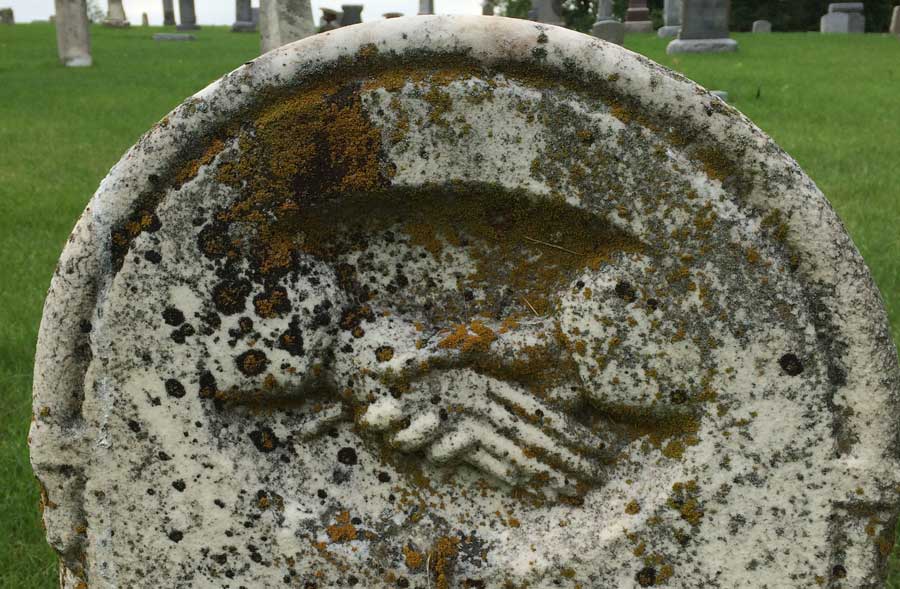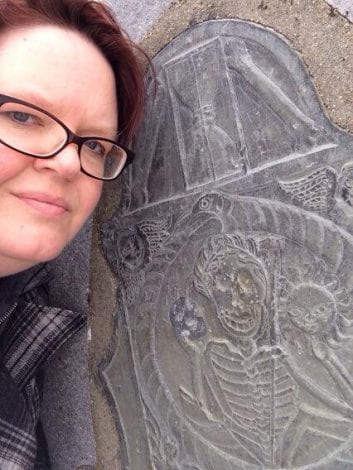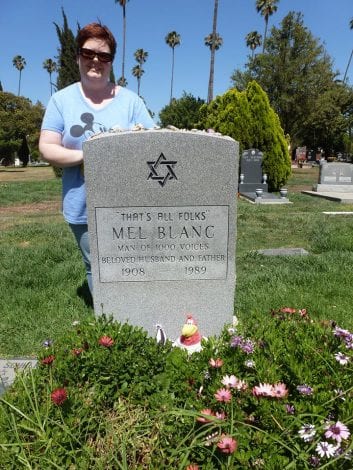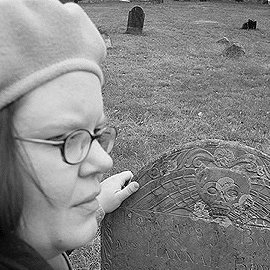
Minda Powers-Douglas is passionate about cemeteries. It was her mother who introduced her to the beauty, history, and art that can be found in what she affectionaly refers to as “outdoor museums.” Her appreciation for the treasures tucked among the tombstones carries through in her books.
Cemetery Walk, published in 2005, is as much a story of Ms. Powers-Douglas’ personal journey as it is an exploration of cemeteries. Chippiannock Cemetery (Images of America), explores the rich history of this Illinois landmark. Translating Tombstones is the definitive guide to the meaning behind the many symbols we see on grave markers of all kinds.
The Cemetery Club, her website, is a rich resource for all things cemetery and the site’s associated Facebook group offers a vibrant venue for taphophiles–people who love cemeteries–from all walks of life. Minda is also the founder of “Epitaphs” magazine.
We recently had a chance to talk with Ms. Powers-Douglas. Join us as we hear her views on life, death, and what it’s like to explore the world of cemeteries.

Minda Powers-Douglas
How did you get involved with cemeteries?
We lived very close to Riverside Cemetery in Moline, Illinois. That’s where it started locally. My mom would take me. She didn’t say ok, we’re at a cemetery and this is a sad place or this is a scary place. We would just look around, look at the stones and the mausoleum. When I started going to school she would go with a friend of hers to all sorts of cemeteries in the area. They didn’t know the stories of the people buried there so they made up their own.
So those are my earliest memories of cemeteries. I wasn’t scared of them and I didn’t think of them as sad. I just thought they were cool places.
After college I was doing some writing workshops for kids and I loved doing that. I loved the kids, but it was a lot of work with not enough volunteers. I had wanted to write a book for a long time and I kept being drawn to non-fiction. Cemeteries kept coming back into my mind. So I dove into the Coptic and went around looking into everything I could find. That’s when “Cemetery Walk” was born. It was a journey for me. It’s part memoir, it talks about my own life, my own thoughts about it. But I also interviewed many different people who worked in cemeteries–sextons, office managers, all types of people.
What stands out about the process?
There was a museum of funeral customs in Springfield, Illinois at the time. They have since closed which is a terrible shame because it was fascinating. I spoke to the curator there and one of the stories he told me was about was an older woman who came in. She was by herself. They had a section on embalming that explained what it is and how it’s done. She went around and looked at all this wonderful stuff. He was talking with someone and she was kind of hovering over to the side. He asked her if he could help her and could tell she almost said no. But she did have a question.” When I was a little girl my mother died and there was this sound during the funeral of drip, drip, drip. And I want to know what that was. And if it’s what I think it was.”
He asked her if it was a home funeral during the hot summer months. When she said yes and it was really hot he explained that the sound was likely the blocks of ice underneath the casket that were keeping the body cool melting into the drip pan. She just started crying because she had thought all these years that the last thing to happen to her mother was botched.
And that story tells me that we need things like that museum. We need places where people can go to learn and understand things because death is scary. We know it’s going to happen and it terrifies us. We just know that something is going to happen, but we don’t know what. I mean really we don’t. No matter how religious you are there has still got to be a question somewhere about what is going to happen.
How do people react when you tell them what you do?
It has changed over the past 10 years. “Cemetery Walk” came out in 2005. During the time I was writing it I would tell people I was working on a book and they would say “that’s wonderful, what is it about?” When told them they would say “why would you do that?” My father-in-law was very concerned that I would get depressed while writing the book. He became one of my biggest advocates after he read it. He said, “I think it should be in every funeral home.” “Well thank you, John, I appreciate that.”
It’s totally different now. There are still some people that think it’s kind of weird, but most people think it’s very interesting. They’ll share a story about a family gravestone or something that they’ve seen. I think part of the reason why it’s more acceptable now to be a taphophile is because of the genealogists.

With Mel Blanc at Hollywood Forever cemetery.
What do you think is the most important role that cemeteries play in society?
The most important role is memorialization. As much as I love to go into cemeteries to learn about the history and see the artwork, it’s the memorialization. It’s being able to go to a place and say your goodbyes at the time of the death and then you go back. It helps you through the grieving process.
I read a story about a little boy who asked his parents why his friend went up to see his grandmother in the cemetery, but they never went to see his grandfather. They told him that the grandfather had been cremated and the ashes scattered. The little boy said that he wanted to see him at the cemetery and leave flowers for him. It ended up the family talked about it and decided they should buy a plot and a stone for the grandfather even though he wasn’t buried there. They felt it was important to have a place to gather or just spend a little time thinking about him and leaving some flowers from time-to-time.
Each one of us on this planet affects at least one somebody and it’s usually more than one. Cemeteries aren’t really for the dead, they’re for the living. I think that everybody deserves a memorial. They deserve something that’s still a material piece, a solid thing that says “I was here… somebody cared about me … remember me.”
So what does it mean for us that cremation is such a big trend?
It’s gotten very popular and understandably so. It is more affordable and you know how expensive funerals can be. But there’s also something I think a number of people don’t understand and this comes from a friend who is in the industry. So many people don’t know what to do with the cremains. She tries to help people understand that you can still bury them. It’s just a smaller spot. There are many beautiful mausoleums with glass niches so you can pick out a pretty urn to display. Many people will put in artificial flowers, photos, maybe a stuffed animal. I think they’re fantastic.
Do you find that being involved in this exploration of cemeteries and a profession related to death has changed your own view of mortality?
Yes, it’s helped me personally deal with things a little better. I have a better understanding and am not quite so scared of it. Before I did a lot of research on cemeteries I would think “gosh, do I want to be buried, do I want to be cremated?” Now I feel like I have the knowledge and I know where I can get more information in order to make a decision like that.
When my daughter was 4 her grandparents on my husband’s side passed away within a few months of each other. And even though she was young we had her with us. She was a part of things. We talked about everything with her so that she would understand it. We weren’t super detailed, but we explained everything to her. She wanted to know what was going to happen. She did very well with it. She didn’t get upset and you could tell she was processing as much as she could. She even said that she thought grandma Mary Ann’s soul is in a little airplane that was flying all the way up to heaven. I thought that was about the sweetest most insightful thing that I’d heard since the whole thing happened. I think it made her feel closer to the family and it didn’t scare it. I’m a big proponent of having children involved in it to the level that they can be.

One of the things that I did around the time that “Cemetery Walk” came out was get ordained to be a civil officiant. I’ve done a number of weddings but one of the main reasons I did it was that I really wanted to be a celebrant so that I could do funerals. I’ve only done one so far and that was for my mother-in-law. It was not only a gift for her, and in her honor, but it really ended up being a gift for me too. Because I felt like I could help my husband and his brothers through a difficult time. It’s not easy, but it’s worth it.
Do you find that people who enjoy exploring cemeteries have anything in common besides the love of cemeteries?
You’ll find a lot of genealogists, they spend a great deal of time rooting around in the cemeteries trying to figure out their family history or helping other people do that. Then there are the people interested in history. If you want to know about a community just go to the cemeteries. Then there are artists–they draw, they paint, they’re photographers. Many people are influenced by cemeteries in some way. They may just like the looks of them–they are interesting and old and wonderful. You can look at them like they’re outdoor museums.
For someone who is interested in cemeteries that hasn’t really started exploring, how would they go about started?
It depends on where their interests lie. If someone’s has a general interest, then just go for a walk in a cemetery and start looking around. You’ll see things and wonder about them and then maybe look up information about what you see. There are tons of people who walk or go running through cemeteries.
Is there anything that you would like our readers to know about cemeteries or about you?
Don’t be afraid to go into cemeteries. They are wonderful places. Go see what they have to say to you. Walk around and something might catch your eye and you might connect with it in some way. Go in to appreciate the history, the art, the fact that these people all came before us. They all lived their lives and they all did things in their time. There’s a story there. Sometimes we don’t know what the story is because it’s just a name and a couple of dates, but sometimes the stories are written on the stones. You might see a stone that just grabs your attention and you want to learn more about who that person was–that’s the big thing.
People should be more interested in helping out and restoring and preserving. The more people that go into cemeteries, the less likely it is that there will be vandalism. Cemeteries don’t have a lot of money. They have huge grounds and the maintenance is constant and you have to tale care of them. Go to the different events that cemeteries host and support them. If there’s a chance to help do it, or just go to events to raise your awareness.











